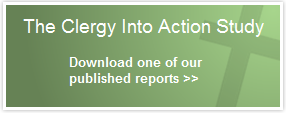It is the third factor of the Temperament Comparator that reveals what could be called a “clergy personality type”: a marked tendency away from self-reliance and toward group dependency.
People who score higher on Dependency-to-Self-Reliance are more self-confident, decisive, persistent, and focused on goals—and less concerned with input or responses from others. In contrast, people who score toward the lower end of Dependency-to-Self-Reliance are very responsive and accommodating to others’ opinions and adaptable to group norms–but also unassertive, and lacking in determination or confidence.
It is noteworthy, the degree to which pastors and priests gravitate toward a dependent disposition toward the work of ministry and leadership—a pattern among newer clergy across denominations that echoes the pattern among more seasoned Episcopal priests. Newer clergy as a group score at the 25th percentile of workers, managers, and executives across other fields, and 50% of newer clergy score below the 16th percentile. This gravitation toward a dependent disposition is in no small part related to how infrequently clergy choose to describe themselves as self-confident and decisive. It is also related to how much clergy are drawn to being in the company of others—it is harder to challenge or set direction for a group when one is motivated to enjoy being with the group.
It should be noted that this disposition toward group dependency exists in a group of clergy who, in their responses to another set of questions, see themselves as moderately high in self-efficacy. Those with higher self-reliance percentile scores also tend to have higher self-efficacy ratings. But why is the median score on dependency-to-self-reliance so skewed toward dependency? To what extent is this related to the culture of the Church that shapes who is selected for ministry and how clergy are trained and deployed? To what extent does the prevailing view of ordained ministry in communities of faith create an expectation of how clergy are to behave?
Clergy stand out markedly from workers and leaders in other fields in their gravitation toward dependency and away from self-reliance. Seasoned Episcopal priests scored low on self-reliance, well below both all groups except base sales workers. More recently ordained pastors and priests from a variety of denominations scored even lower on self-reliance. This kind of work-disposition alerts the human resource professional to considering such a group as most suited for work in structured and stable environments, and less suited for work in entrepreneurial settings.
Why do clergy, and especially new clergy, see themselves as so much more dependent than self-reliant? Often serving in assistant positions or as new solo pastors in small churches, new clergy gravitation toward dependency may be related to their relatively “new” status as fully ordained pastors and priests. But clergy overall are less self-reliant than other workers across fields. Even people in sales, concerned to connect and join with the people to whom they are selling, score higher in self-reliance. This is largely due to clergy’s low frequency of marking themselves of decisive or self-confident.
An absence of self-reliance—or a marked turn toward group dependency—results in a lack of persistence and determination, so that such people “seldom take sustained, constructive action” to address the arousals of anxiety or excitement they may experience.1 Lack of decisiveness and self-confidence can alter how one makes use of one’s introversion or extraversion…and not in helpful ways.
For Your Consideration
- Can self-confidence and decisiveness be understood theologically as good, positive qualities for Christian ministry and leadership? Or are these qualities antithetical to the Gospel and to the way of Christian community?
- How can self-confidence and decisiveness be strengthened in clergy, while continuing to uphold clergy’s deep concern for others?
Related Articles
- Overview: Is There a “Clergy Personality”?
- Part 1: Introverted or Extraverted: Does It Matter?
- Part 2: How Do Clergy Engage Emotions?
- On Self-Efficacy: Self-Efficacy and Leadership
1 Melany Baehr, Temperament Comparator: Form S, Interpretation and Research Manual (Minneapolis, MN: Reid London House, 1996), p. 4.




